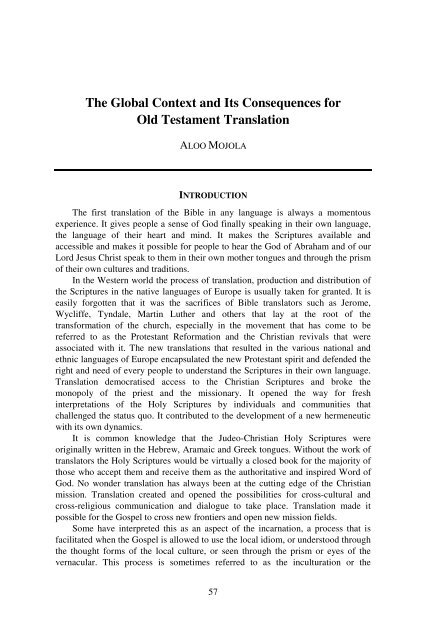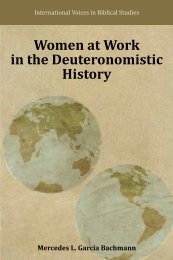Global Hermeneutics? - International Voices in Biblical Studies ...
Global Hermeneutics? - International Voices in Biblical Studies ...
Global Hermeneutics? - International Voices in Biblical Studies ...
Create successful ePaper yourself
Turn your PDF publications into a flip-book with our unique Google optimized e-Paper software.
The <strong>Global</strong> Context and Its Consequences for<br />
Old Testament Translation<br />
ALOO MOJOLA<br />
INTRODUCTION<br />
The first translation of the Bible <strong>in</strong> any language is always a momentous<br />
experience. It gives people a sense of God f<strong>in</strong>ally speak<strong>in</strong>g <strong>in</strong> their own language,<br />
the language of their heart and m<strong>in</strong>d. It makes the Scriptures available and<br />
accessible and makes it possible for people to hear the God of Abraham and of our<br />
Lord Jesus Christ speak to them <strong>in</strong> their own mother tongues and through the prism<br />
of their own cultures and traditions.<br />
In the Western world the process of translation, production and distribution of<br />
the Scriptures <strong>in</strong> the native languages of Europe is usually taken for granted. It is<br />
easily forgotten that it was the sacrifices of Bible translators such as Jerome,<br />
Wycliffe, Tyndale, Mart<strong>in</strong> Luther and others that lay at the root of the<br />
transformation of the church, especially <strong>in</strong> the movement that has come to be<br />
referred to as the Protestant Reformation and the Christian revivals that were<br />
associated with it. The new translations that resulted <strong>in</strong> the various national and<br />
ethnic languages of Europe encapsulated the new Protestant spirit and defended the<br />
right and need of every people to understand the Scriptures <strong>in</strong> their own language.<br />
Translation democratised access to the Christian Scriptures and broke the<br />
monopoly of the priest and the missionary. It opened the way for fresh<br />
<strong>in</strong>terpretations of the Holy Scriptures by <strong>in</strong>dividuals and communities that<br />
challenged the status quo. It contributed to the development of a new hermeneutic<br />
with its own dynamics.<br />
It is common knowledge that the Judeo-Christian Holy Scriptures were<br />
orig<strong>in</strong>ally written <strong>in</strong> the Hebrew, Aramaic and Greek tongues. Without the work of<br />
translators the Holy Scriptures would be virtually a closed book for the majority of<br />
those who accept them and receive them as the authoritative and <strong>in</strong>spired Word of<br />
God. No wonder translation has always been at the cutt<strong>in</strong>g edge of the Christian<br />
mission. Translation created and opened the possibilities for cross-cultural and<br />
cross-religious communication and dialogue to take place. Translation made it<br />
possible for the Gospel to cross new frontiers and open new mission fields.<br />
Some have <strong>in</strong>terpreted this as an aspect of the <strong>in</strong>carnation, a process that is<br />
facilitated when the Gospel is allowed to use the local idiom, or understood through<br />
the thought forms of the local culture, or seen through the prism or eyes of the<br />
vernacular. This process is sometimes referred to as the <strong>in</strong>culturation or the<br />
57




